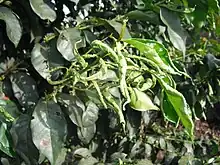Hoplandrothrips
Hoplandrothrips[1](commonly misspelled as Hoplandothrips[2]) is a genus of thrips in the Phlaeothripidae family.[3] Some species are recorded as pests on coffee growing in East Africa, causing a distinctive rolling of the leaf.[2][4] The genus was first described in 1912 by J. Douglas Hood.[1][5]

Leaves on a coffee tree that have rolled up due to Hoplandrothrips
| Hoplandrothrips | |
|---|---|
.jpg.webp) | |
| A squashed Hoplandrothrips | |
| Scientific classification | |
| Kingdom: | |
| Phylum: | |
| Class: | |
| Order: | |
| Family: | |
| Subfamily: | |
| Genus: | Hoplandrothrips Hood, 1912 |
Description
Adults are dark brown and around 2 mm long and the larvae are pale yellow.[6] In coffee, they feed on young leaves causing them to roll very tightly, reducing the photosynthetic area of the leaf. They tend to cause little loss in yield however compared to coffee berry borer and antestia bugs.[2]
Species
- Hoplandrothrips abrasi
- Hoplandrothrips acaciae
- Hoplandrothrips affinis
- Hoplandrothrips albipes
- Hoplandrothrips angulosus
- Hoplandrothrips angustatus
- Hoplandrothrips approximatus
- Hoplandrothrips armiger
- Hoplandrothrips arrhenus
- Hoplandrothrips bartlei
- Hoplandrothrips bellicosus
- Hoplandrothrips bidens Bagnall, 1910[4]
- Hoplandrothrips bournieri
- Hoplandrothrips brasiliensis
- Hoplandrothrips bredoi Praisner[2] - a minor pest of coffee in the Democratic Republic of Congo
- Hoplandrothrips brunneicinctus
- Hoplandrothrips brunneicornis
- Hoplandrothrips casamancae
- Hoplandrothrips caudatus
- Hoplandrothrips chapmani
- Hoplandrothrips choritus Mound & Walker, 1986[4]
- Hoplandrothrips coffeae Bagnall[2] - a minor pest of coffee in western Tanzania
- Hoplandrothrips coloratus
- Hoplandrothrips consobrinus
- Hoplandrothrips cooperi
- Hoplandrothrips coorongi
- Hoplandrothrips corticis
- Hoplandrothrips costano
- Hoplandrothrips cubicola
- Hoplandrothrips edentatus
- Hoplandrothrips ellisi
- Hoplandrothrips elongatus
- Hoplandrothrips erythrinae
- Hoplandrothrips esakii
- Hoplandrothrips famelicus
- Hoplandrothrips fasciatus
- Hoplandrothrips flavidus
- Hoplandrothrips flavipes
- Hoplandrothrips forbesi
- Hoplandrothrips fusciflavus
- Hoplandrothrips fuscus
- Hoplandrothrips gloriosi
- Hoplandrothrips gynandrus
- Hoplandrothrips hemiflavus
- Hoplandrothrips hesperidum
- Hoplandrothrips honestus
- Hoplandrothrips hoodi
- Hoplandrothrips horridus
- Hoplandrothrips howei
- Hoplandrothrips huastecus
- Hoplandrothrips hungaricus
- Hoplandrothrips hylaius
- Hoplandrothrips hystrix
- Hoplandrothrips ibisci
- Hoplandrothrips ingenuus Mound & Walker, 1986[4]
- Hoplandrothrips insolens
- Hoplandrothrips irretius
- Hoplandrothrips jasmini
- Hoplandrothrips jennei
- Hoplandrothrips jennyae
- Hoplandrothrips juniperinus
- Hoplandrothrips kudoi
- Hoplandrothrips landolphiae
- Hoplandrothrips leai
- Hoplandrothrips lepidus
- Hoplandrothrips lissonotus
- Hoplandrothrips longirostris
- Hoplandrothrips maderensis
- Hoplandrothrips marshalli Karny[2] - a moderate pest of coffee in the Democratic Republic of Congo and Uganda.
- Hoplandrothrips mcateei
- Hoplandrothrips microps
- Hoplandrothrips nasutus
- Hoplandrothrips neovulcaniensis
- Hoplandrothrips nigricestus Hood, 1934 [7]
- Hoplandrothrips nipponicus
- Hoplandrothrips nobilis
- Hoplandrothrips nonakai
- Hoplandrothrips obesametae
- Hoplandrothrips ochraceus
- Hoplandrothrips olmecanus
- Hoplandrothrips ommatus
- Hoplandrothrips oreillyi
- Hoplandrothrips orientalis
- Hoplandrothrips pallens
- Hoplandrothrips palmerae
- Hoplandrothrips parvus
- Hoplandrothrips pergandei
- Hoplandrothrips picticornis
- Hoplandrothrips priesneri
- Hoplandrothrips proteus
- Hoplandrothrips quadriconus
- Hoplandrothrips quercuspumilae
- Hoplandrothrips raptor
- Hoplandrothrips russelli
- Hoplandrothrips rusticus
- Hoplandrothrips ryukyuensis
- Hoplandrothrips salicacearum
- Hoplandrothrips schoutedeni
- Hoplandrothrips scutellaris
- Hoplandrothrips sides
- Hoplandrothrips symmetricus
- Hoplandrothrips tarascus
- Hoplandrothrips tareei
- Hoplandrothrips tristissimus
- Hoplandrothrips trucatoapicus
- Hoplandrothrips trybomi
- Hoplandrothrips tumiceps
- Hoplandrothrips ugandensis
- Hoplandrothrips uzeli
- Hoplandrothrips vansoni
- Hoplandrothrips variegatus
- Hoplandrothrips vazquezae
- Hoplandrothrips vernus Mound & Walker, 1986[4]
- Hoplandrothrips virago
- Hoplandrothrips williamsianus
- Hoplandrothrips xanthocnemis
- Hoplandrothrips xanthopoides Bagnall, 1917[7]
References
- "Australian Faunal Directory: Hoplandrothrips". biodiversity.org.au. Retrieved 2022-07-04.
- Jean Nicolas Wintgens (12 March 2009). Coffee: Growing, Processing, Sustainable Production: A Guidebook for Growers, Processors, Traders, and Researchers. Wiley-VCH. pp. 437–438. ISBN 978-3-527-32286-2. Retrieved 25 September 2011.
- Roskov Y., Ower G., Orrell T., Nicolson D., Bailly N., Kirk P.M., Bourgoin T., DeWalt R.E., Decock W., Nieukerken E. van, Zarucchi J., Penev L., eds. (2019). Species 2000 & ITIS Catalogue of Life, 2019 Annual Checklist. Species 2000: Naturalis, Leiden, the Netherlands. ISSN 2405-884X.
- "Hoplandothrips - Information on Hoplandothrips - Encyclopedia of Life". Archived from the original on 2012-10-16. Retrieved 2011-09-25.
- J. Douglas Hood (1912). "Descriptions of new North American Thysanoptera". Proceedings of the Entomological Society of Washington. 14 (3): 129-160 [145]. ISSN 0013-8797. Wikidata Q112894196.
- D. S. Hill (17 November 2008). Pests of Crops in Warmer Climates and Their Control. Springer. pp. 266–. ISBN 978-1-4020-6737-2. Retrieved 25 September 2011.
- "STRI Research Portal Home". Panamabiota.org. Retrieved 2 May 2022.
This article is issued from Wikipedia. The text is licensed under Creative Commons - Attribution - Sharealike. Additional terms may apply for the media files.